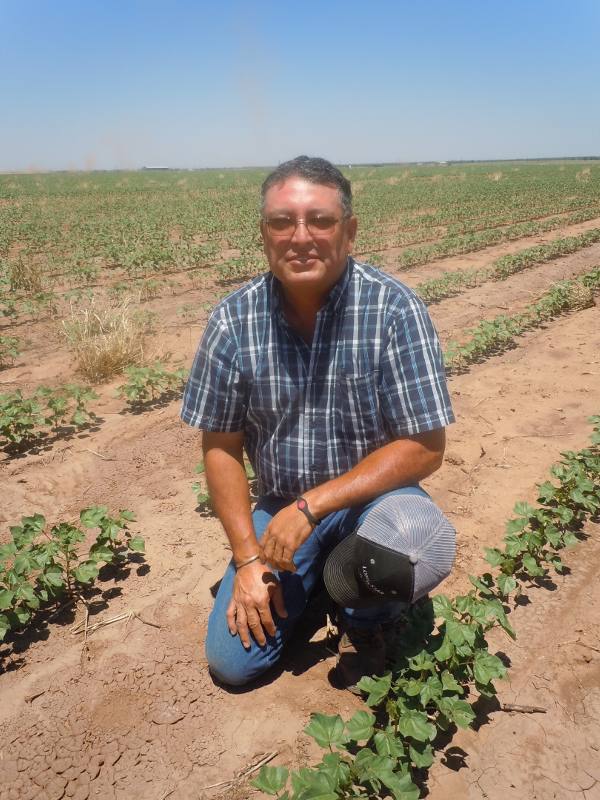July 6, 2012

Unsettled summer weather is keeping North Texas cotton growers like Richard Gaona of Roby, Texas, plenty busy. A lifetime farmer in Fisher County, Gaona worries this year about a diminishing irrigation water source as well as establishing dryland cotton.
"I have 190 acres of cotton planted in fields with underground drip irrigation," he said. "There is sufficient water available now, but when the real demand period comes in July, I’m afraid the water supply will run out."
Farming in sandy loam soil, Gaona was busy repairing a broken underground water line in his irrigated cotton and, at the same time, scourging dryland fields with tractors and "sand fighters" to help new cotton break through rain-crusted soil.
Gaona also farms 2,500 acres of dryland cotton. Most of his fields are planted with FiberMax B2Flex varieties, he said. He also has two fields of LibertyLink cotton.
A recent one-inch rain had crusted over several of his sandy loam fields, causing him to run the "sand fighters" through the surface crust to give the newly-planted cotton a better chance to grow. The 2011 historic drought prevented Gaona from harvesting any cotton last year. That bad experience has him looking over his shoulder at multiple days of plus 100 degree heat and no rain.
"Even though we had an inch of rain recently in this area, our fields are already drying out and the young cotton is getting stressed."
He pulls irrigation water from several wells, drawing from the Seymour aquifer. His irrigated crop is watered from an underground drip system yielding one-half inch of water per day. All of Gaona's fields are mapped with GPS technology, allowing him to use John Deere Green Star GPS equipment to reduce fuel costs and trips across the fields, he said.
He’s used strip-tillage for the past three years and plants winter wheat between his cotton rows to protect the young cotton from wind and blowing sand. He grazed most of his 2012 wheat crop and baled the rest to replenish his hay supply that was used up feeding cattle last winter during the drought.
"I have 150 beef cows," he said. "I was fortunate to have enough pasture, hay and stock water to keep them. Now, all of our dirt pasture tanks are dry."
At 53 years old, Gaona has been farming 30 years. He is a second generation Texas farmer, learning from his father, Jeronimo Gaona, who came to Texas from Mexico as a young man. Jeronimo began as a farm worker, gradually renting and then buying his own farm land. "My father was a hard worker and I learned a lot from him," Richard said.
Gaona became secretary-treasurer of the Rolling Plains Cotton Growers Association, headquartered at Abilene, in January, 2012. He is a member of the board of directors of the Lone Star Agricultural Credit Associations in Sweetwater and Abilene, Texas.
Gaona and his wife, Judy, have five children and four grandchildren.
NTOK Cotton, a cotton industry partnership, supports and encourages increased cotton production in the Rolling Plains of North Texas, Oklahoma and Kansas. For more information on the cotton scene, see ntokcotton.org.
You May Also Like




